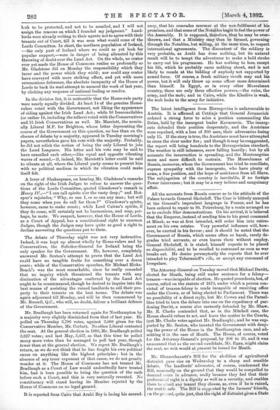The Attorney-General on Tuesday moved that Michael Devitt, elected for
Meath, being still under sentence for a felony- treason—was incapable of election. He quoted precedents,but, of course, relied on the statute of 1870, under which a person con- victed of treason-felony is made incapable of receiving office under the Crown, or of being elected to Parliament. There was no possibility of a direct reply, but Mr. Cowen and the Parnel- lites tried to turn the debate into one on the expediency of par- doning Devitt, a course also earnestly defended by Mr. Shaw.. Mr. E. Clarke contended that, as in the Mitchell case, the House should refuse to act, and leave the matter to the Courts, (yet Mr. Clarke votes against Mr. Bradlaugh) ; and he was sup- ported by Mr. Sexton, who taunted the Government with deny- ing the power of the House in the Northampton case, and ad- mitting it in the case of Meath. The House, of course, voted far the Attorney-General's proposal, by 208 to 20, and it was announced that as the second candidate, Mr. Egan, might claim the seat, no writ would at present be issued for Meath.


































 Previous page
Previous page